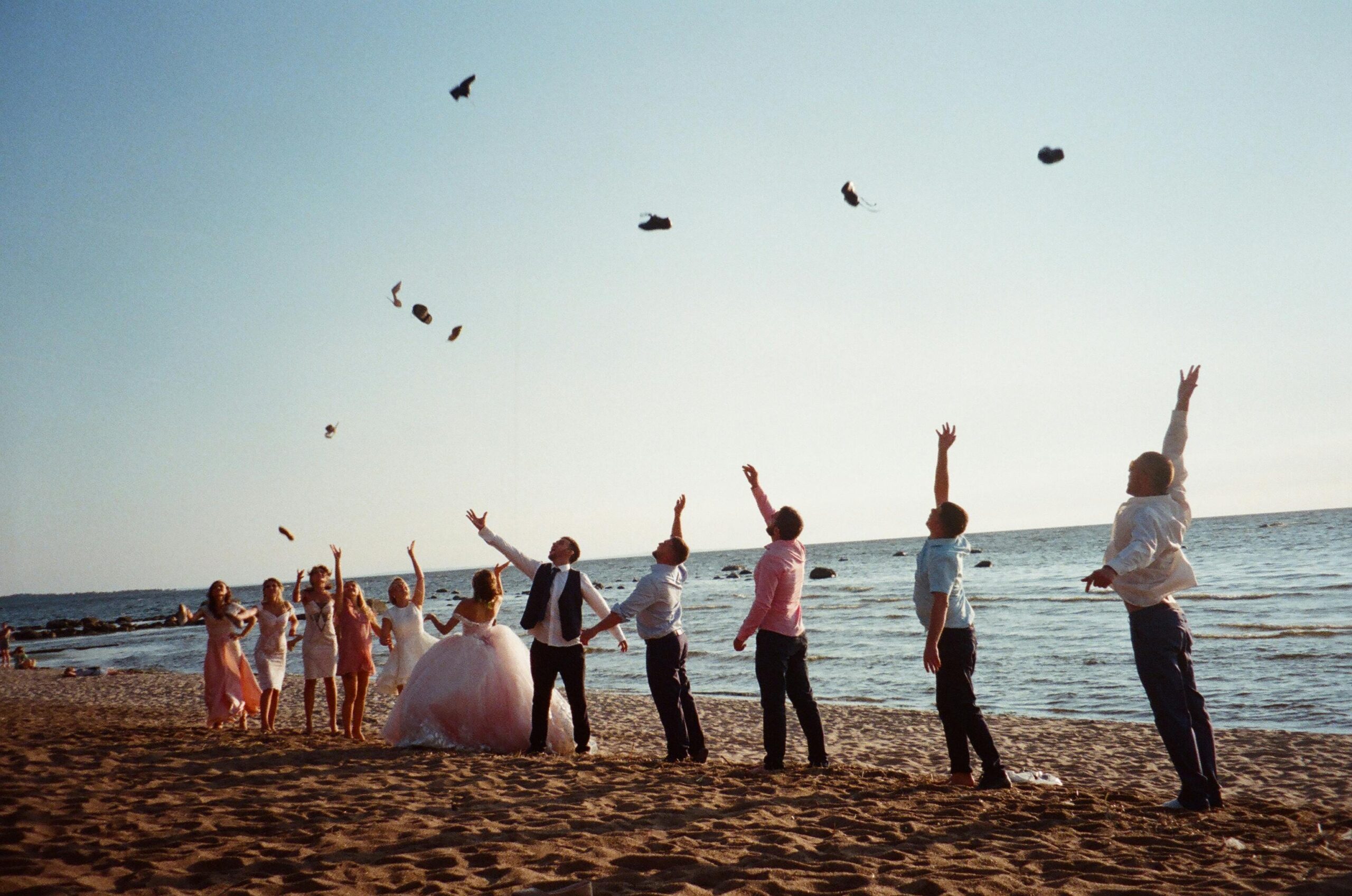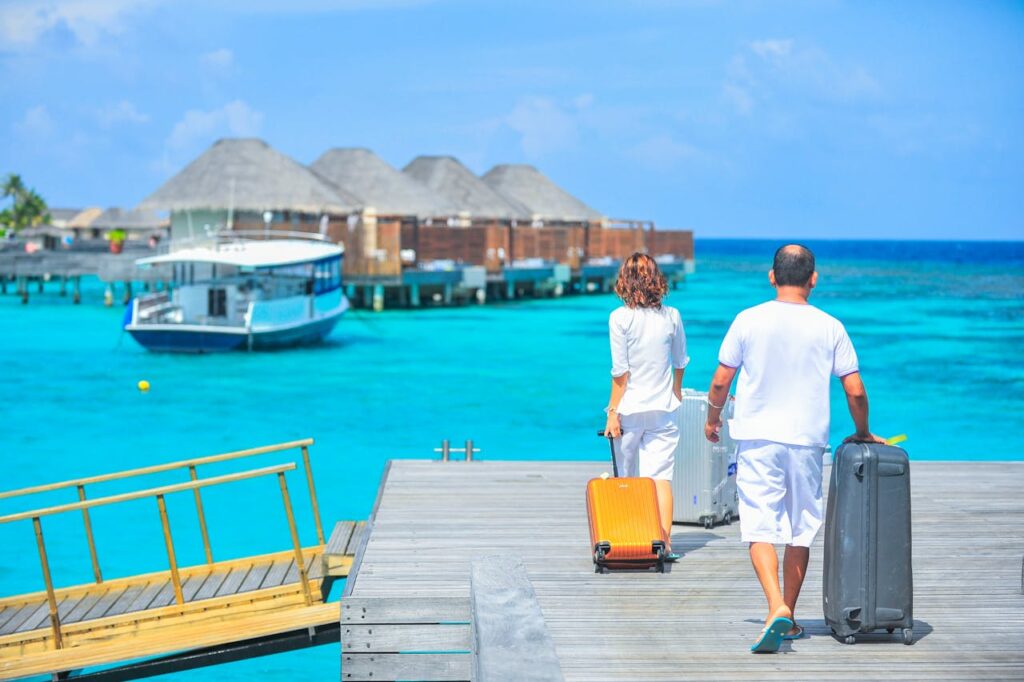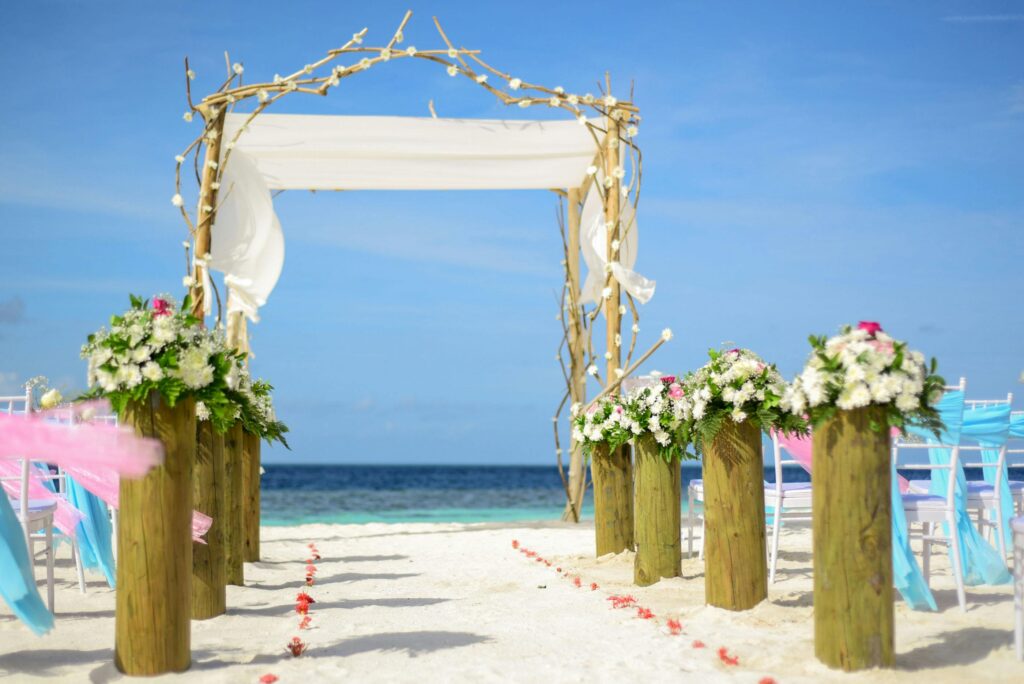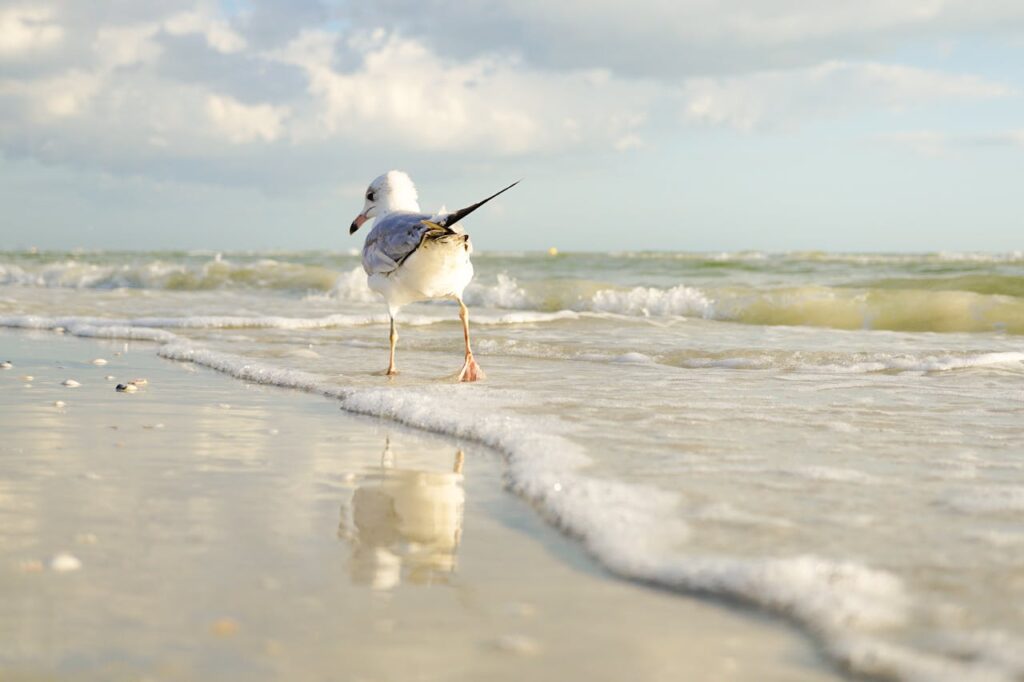
Standing in the midst of nature’s beauty often brings forth feelings of tranquility, vulnerability, connection, and mindfulness. A common backdrop where this is especially true is a beach overlooking the rolling waves of a vast ocean. Is it any wonder people flock to the nearest coast to celebrate their vacation, their graduation, and especially their marriage? Destination weddings have always existed, but recent years have seen the trend rise in popularity as couples prioritize their overall wedding experience over long over-formal ceremonies. Of all the destinations, beaches continue to be one of top choices due to their natural beauty and general accessibility. Like every destination wedding, there is some additional thought and planning that needs to be put in to ensure the day runs smoothly, and a ceremony on pearly white sand comes with its own unique challenges to keep in mind. If a beach wedding is in your future, here are some tips to help you plan ahead.
Don’t Balk on the Research

As important as it is to do your research when planning local events, it is even more important to research thoroughly when planning a destination beach wedding. There are a lot of technical requirements and logistics that go into planning a wedding from a distance. You will need to decide whether you are using a private venue on the beach or whether you prefer to scout out a section of public land to use. If you decide against an established venue, make sure to check for any permits you need or regulations to follow for hosting an event on a public beach. Look for larger vendors like caterers and florists close to your destination. You can do the same for smaller vendors like makeup artists and photographers, or work with them to arrange travel and lodging at your destination if you have your heart set on a local vendor. Look for a rental company close to your destination, or arrange to travel with your rented items. To ensure everything goes to plan, hire a planner that either specializes in destination weddings or is local to your destination. Not only are they able to help with the planning process, but they are able to meet with prospective vendors and tour venues for you if you are not able to travel there yourself ahead of time. Ultimately, you want to have the time and knowledge to iron out any issues long before your wedding day arrives, so start researching as early as possible and take the time to be thorough.
Time It Right

When it comes to a successful beach wedding, timing is everything. Everything from the season, to the day of the week, to the time of day is important. Since beaches are such popular vacation destinations, choosing the right season can mean the difference between a quiet and crowded beach. Busy seasons are going to differ from coast to coast, and even from beach to beach, so make sure to research the on and off seasons for your specific destination. Additionally, pay attention to the predicted storm season for your beach. The changing temperatures in early spring and late fall create prime conditions for major storms, so make sure you are not setting yourself up for a hurricane wedding. When you’ve nailed down the season, consider the day of the week as well. Beaches are always the busiest on the weekends, so consider having a mid-week ceremony to mitigate the crowd. Additionally, consider starting in the morning or late evening for the same reason. When it comes to setting up your ceremony, remember to check the tide charts for your area. These will give you estimated times for high and low tides so you can plan out where to place your decorations without getting washed away.
Consider Your Guests

Destination weddings often require a lot of travel for a lot of people, so be sure to consider your guests in your planning process to ensure they can enjoy your wedding as much as you do. While you are by no means required to pay for your guests’ travel and board, there are other things you can do to help your guests arrive safely and stay comfortably. Research airports and transportation services in the area that your guests can utilize, and communicate any parking difficulties ahead of time so your guests can come prepared. Consider reserving a hotel block for your guests to book, or at least provide a list of lodgings in the area in multiple price points so your guests can find accommodations within their budget. Consider also any mobility issues your guests may have. While beautiful, sand can be a difficult surface to walk on. Have a plan in place to help your guests reach their seats, whether it be a temporary walkway installation or ushers specifically assigned to escorting mobility impaired guests to their seats. It may seem like a small detail, but it can make a big difference to your guests in the long run.
Design Mindfully

The beach is a natural beauty on its own, but you can accentuate this beauty with other design details to personalize the look and theme. Whether you are leaning into the beachy nautical theme or branching off into something more unique, keep in mind that decorating anything on the beach is not without challenges. Unlike hard flooring like stone or compacted dirt, sand shifts and sinks under pressure. To make sure chairs, arbors, and other decor items don’t sink and lean into the sand, make sure everything has a wide and flat base that can distribute weight and sit on top of the sand. To fight against the wind coming in off the water, make sure lighter items are staked or weighted down. Be mindful also of the sound of the water. Waves rolling and crashing onto shore create quite a bit of noise, so setting up a bit further from the shoreline and incorporating sound systems into your design can help make sure you are heard when it matters most.
Considerations for Nature

As with any event that happens outdoors, make sure to have a weatherproof backup plan. You can do all the right research and pick all the right timings, but the weather will ultimately do what it wants to do. Just in case the weather decides not to cooperate and sends rain, strong winds, dangerous tides, or storms your way, make sure you have a backup plan in place. This can be a large tent you can move into, or it can be an event space, resort, or restaurant on the beach. Also keep in mind that you are borrowing your beach space from nature, and you want to return it in the same condition you found it in. The ocean and neighboring shorelines are home to numerous creatures that can be harmed by stray decorations and trash, so make sure everything is secured properly and delegate a team of people to make sure the beach is clean after your wedding is over. This is not only considerate to the animals living on the beach and in the water, but also to the other beachgoers who will come after you.




